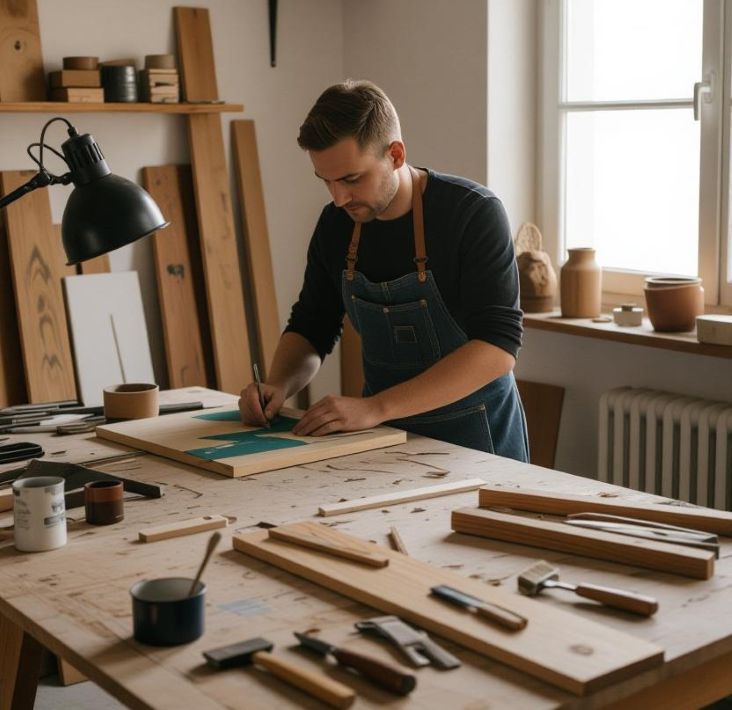
Across the Netherlands, small workshops are quietly shaping the country’s design identity. From hand-carved wooden plaques to sleek acrylic nameplates, local artisans are reviving the spirit of craftsmanship that once defined European neighborhoods. These small-scale sign makers are preserving a culture of personal connection and creativity in a time when mass production dominates the market.
AllesMakkelijk, a small Dutch company, has become part of this inspiring shift. Their approach to making customized gifts and home signs reflects a growing appreciation for meaningful, handmade items. When customers personalize a gift with a name (cadeau met naam personaliseren), they do more than buy an object. They support a network of local makers who value craftsmanship, environmental responsibility, and personal touch. In a global economy where everything feels automated, these businesses remind us that human creativity still matters.
The Heartbeat of Local Creativity
Small sign-making workshops in the Netherlands often begin as family businesses. Many started in garages or small studios, passed down from one generation to the next. Each sign carries a personal story of local pride, experimentation, and care. Unlike mass-produced factory items, these creations embody time and attention. Customers know that every engraved letter or painted stroke has been guided by a craftsman’s hand.
This intimacy between maker and buyer builds trust and loyalty. Consumers increasingly value knowing where their products come from and who makes them. Supporting local sign makers ensures that money circulates within the community, rather than disappearing into global supply chains. It also helps sustain skills that are at risk of fading like wood engraving, metal etching, and hand lettering are all part of Europe’s cultural heritage that artisans continue to celebrate.
Sustainability and Small-Scale Manufacturing
Supporting small sign-making businesses is also a vote for sustainability. Large factories often rely on resource-heavy production and global shipping. Local makers, by contrast, focus on small batches and eco-friendly materials. Many Dutch artisans now use recycled wood, biodegradable paint, or energy-efficient laser cutters. This approach minimizes waste while producing long-lasting, high-quality products.
Consumers benefit from these choices too. By buying locally made goods, they reduce their carbon footprint and encourage responsible consumption. The simple act of ordering a handmade sign can ripple outward inspiring others to value slow design over instant gratification. When someone decides to personalize a gift with a name from a small business, it becomes both a creative and ethical statement.
The European Trend Toward Local Entrepreneurship
Across Europe, there’s a growing movement to rediscover the value of local entrepreneurship. Markets in cities like Amsterdam, Antwerp, and Copenhagen are filled with small makers showcasing signs, décor, and custom gifts that highlight craftsmanship over commercialism. Governments and consumers alike are recognizing that vibrant local economies depend on these micro-businesses that create jobs, preserve culture, and reduce reliance on imports.
The digital age has made this easier than ever. Platforms like AllesMakkelijk use modern technology to reach customers nationwide while keeping their production personal and small-scale. This blend of online convenience and offline authenticity allows artisans to thrive in a competitive marketplace. As discussed in the relationship between art and politics, creative expression often mirrors social and economic values, making local craftsmanship an important part of cultural identity. It also gives customers access to something that feels genuine, a gift that carries a story and a name, rather than a barcode.
Why Every Purchase Matters
Every sign sold by a small workshop represents more than a transaction. It represents hours of design, careful assembly, and a commitment to artistic integrity. When customers choose these businesses, they help keep craftsmanship alive. They also encourage younger generations to pursue creative careers and see value in working with their hands.
There’s a sense of pride that comes from displaying something made locally. Whether it’s a door plaque, a mailbox nameplate, or a gift engraved for a loved one, these creations reflect personal identity and local artistry. Supporting local craftsmanship is more than a trend, it’s a movement toward mindful living and meaningful exchange.
Conclusion: A Future Built on Local Hands
As Europe continues to embrace sustainability and creativity, small sign-making businesses stand at the heart of this transformation. They show that quality doesn’t have to mean mass production, and personalization doesn’t need to rely on algorithms. Choosing to personalize a gift with a name from a local brand like AllesMakkelijk is a small but powerful way to support this vision. Each handcrafted sign strengthens the bond between maker and community, a reminder that local craftsmanship still shapes our modern economy, one nameplate at a time.
